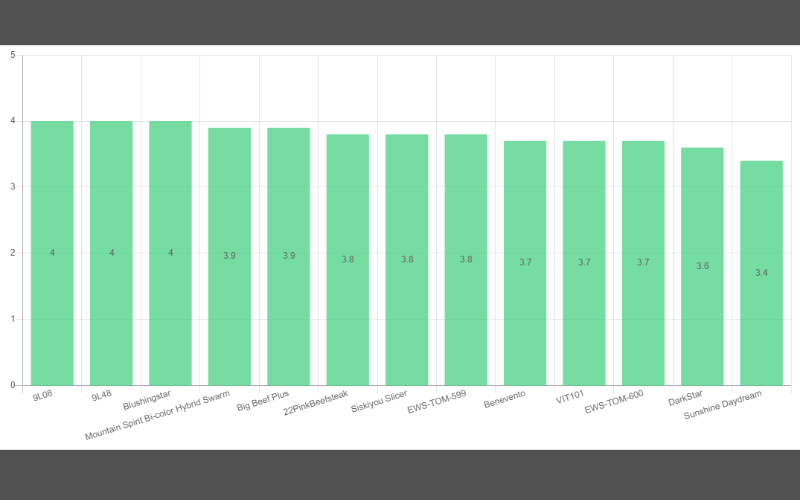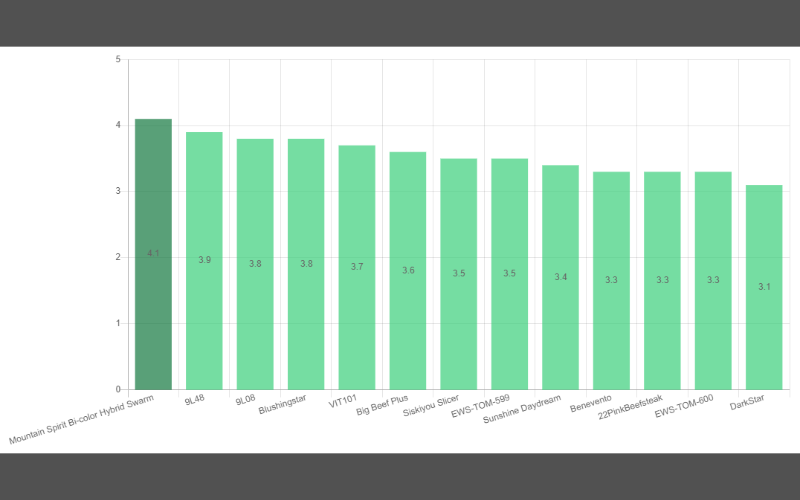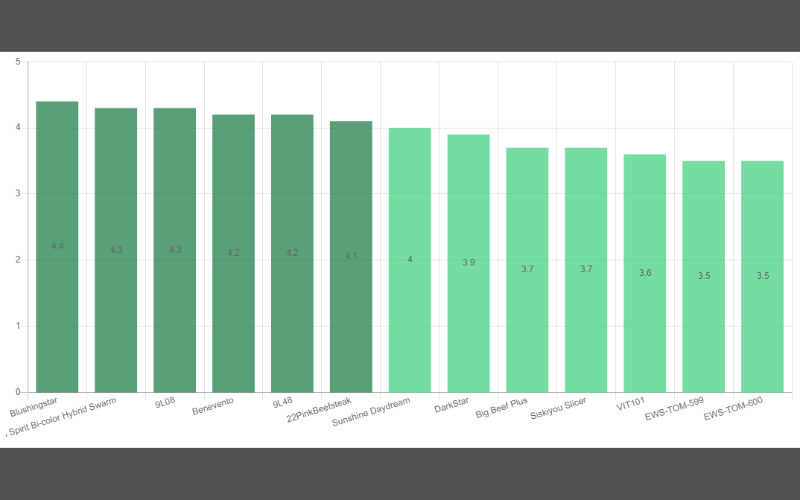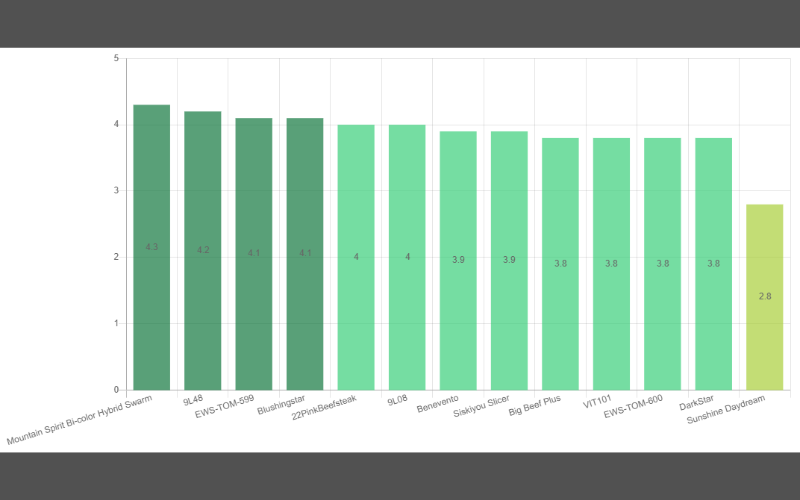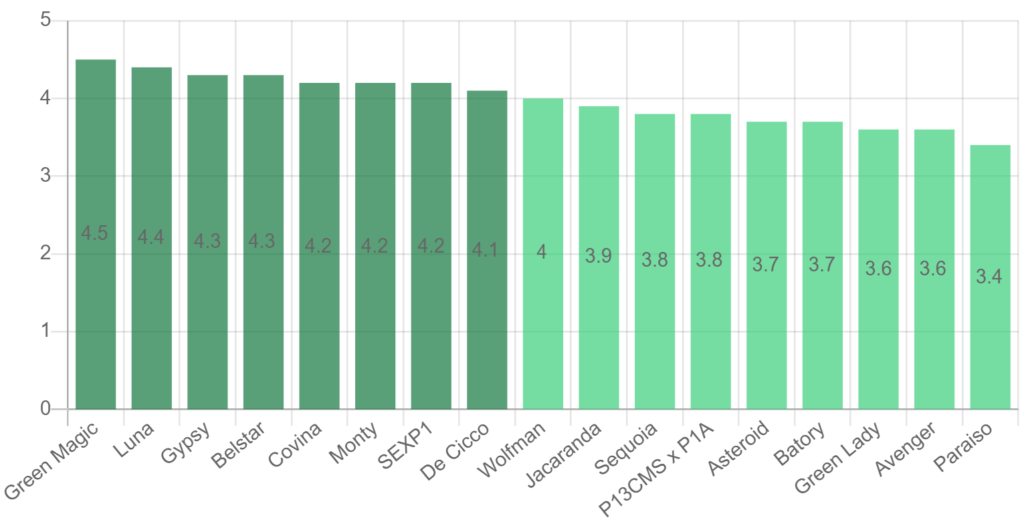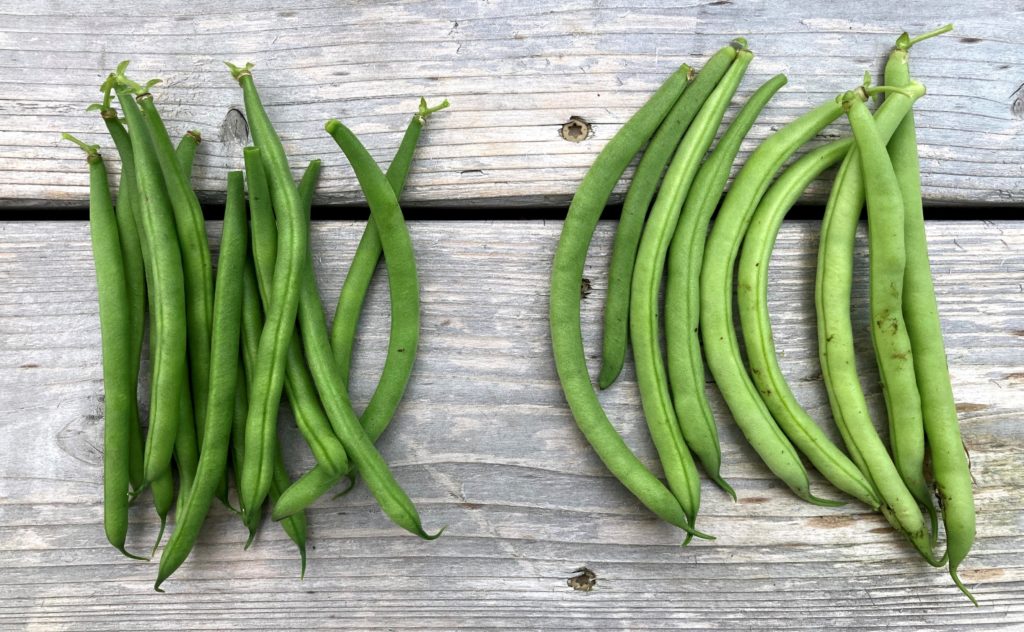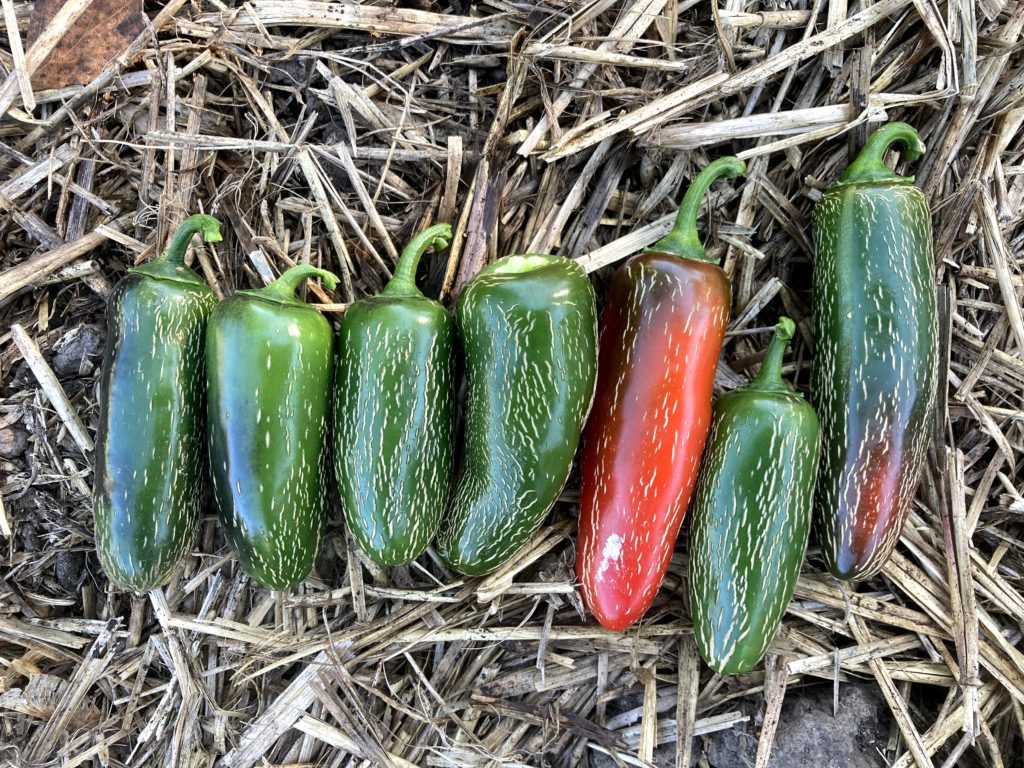In 2022, we organized a slicer tomato collaborative variety trial with the goal of having farmers and gardeners across North America grow well-known varieties side-by-side with newly released hybrid and open-pollinated varieties and rate them for a variety of traits on the SeedLinked platform. At the conclusion of the growing season, our aim was to freely share the results of our variety trial on our Seed Marketplace and in this blog with growers, seed companies, and anyone else who is interested. Thank you for your interest and taking a look!
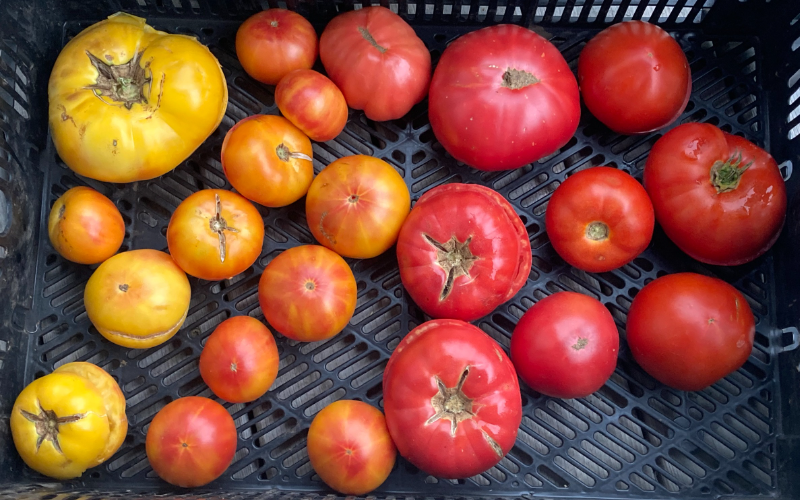
Trial Methods
In January 2022, the SeedLinked team searched through seed catalogs for standard open-pollinated and hybrid slicer tomato varieties. Additionally, we reached out to tomato breeders and seed companies in the United States to see if they had any newly bred and/or released open-pollinated and hybrid varieties to add to the trial to see what performed best. We had a great response and had the following businesses share varieties with us: A.P. Whaley, Artisan Seeds, Earthworks Seed, Johnny’s Selected Seeds, KC Tomato, PanAmerican Seeds, Vitalis Organic Seeds, Siskiyou Seeds, and Wild Mountain Seeds. Thank you to the companies for their generosity and willingness to participate!
Varieties in the 2022 SeedLinked Slicer Tomato Collaborative Variety Trial were: Benevento, Big Beef Plus, BlushingStar, DarkStar, EWS-TOM-599, EWS-TOM-600, Mountain Spirit Bi-color Hybrid Swarm, Siskyou Slicer, Sunshine Daydream, VIT101, 22PinkBeefsteak, 9L08, and 9L48. We used Big Beef Plus Tomato as our check variety in the trial as it is a commonly grown hybrid slicer tomato. Additionally, the varieties with numbers in their names are not currently commercially available, although many might be in the next few years.
Also in January 2022, we invited farmers and gardeners across the United States to join our trial by reaching out to those who have successfully been part of our trials in the past as well as through an open link on our website. We had 127 growers join the slicer tomato trial (see map below). The trial was a sub-set trial, where each participant was randomly assigned three varieties from the larger set of 13 varieties to grow side-by-side and rate them on the SeedLinked website or App (Android or iPhone/iPad).
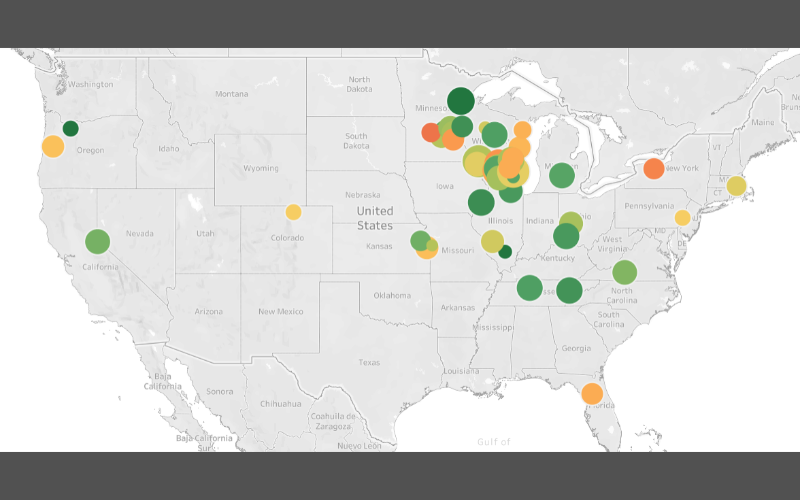
In the first week of March 2022, we mailed tomato seeds and planting stakes to trial participants and made the trial active on SeedLinked so growers could start entering their reviews.
During the 2022 growing season, trial participants grew the varieties as they normally would in their garden or on their farm and were asked to log in to SeedLinked on the web and/or app and input the following data:
- Dates: planting, transplanting, first harvest, and last harvest dates
- Traits: rate each variety on a scale of 1 to 5 stars for the following traits: appearance, cracking resistance, disease resistance, earliness, flavor, marketability, storage, vigor, yield, and overall
- Comments: provide general and trait-based written comments
- Images: share photos of the varieties growing and harvested fruit
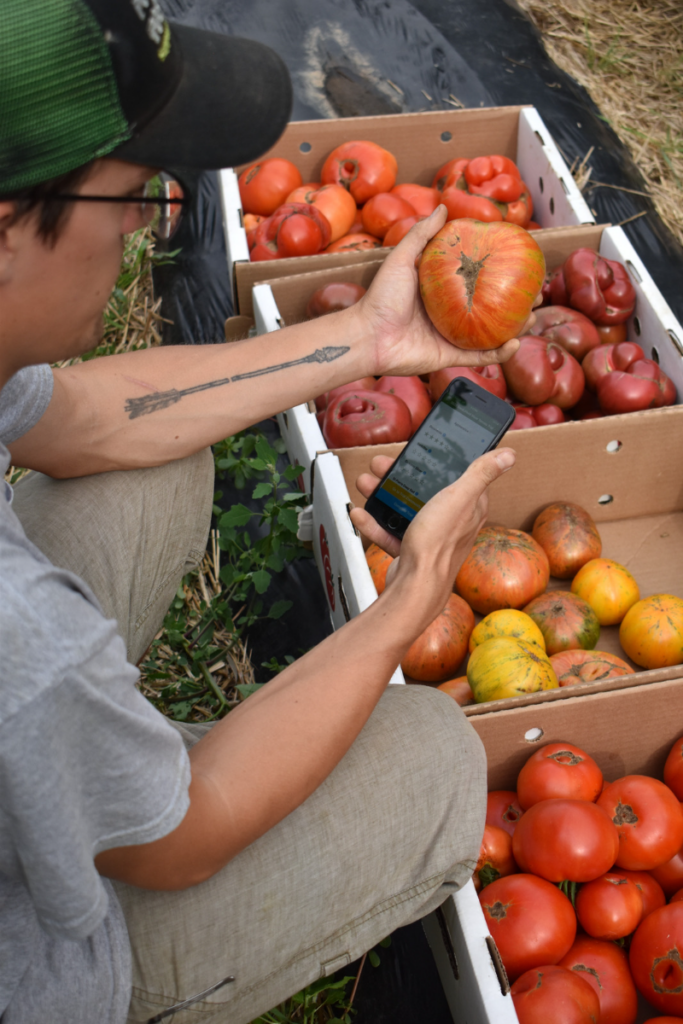
2022 SeedLinked Slicer Tomato Trial Results
Once the trial was closed for entering data in December 2022, results were automatically calculated by the SeedLinked platform and shared with participants. Of the 127 growers that accepted the trial and received seeds, 70 grew out the varieties and shared their reviews on SeedLinked, which is an exceptional rate of participation for a collaborative variety trial. You can view the interactive slicer tomato trial results HERE.
Note: We recommend logging into your existing SeedLinked account or creating an account when viewing the results. This gives you the opportunity to filter results by hardiness zone to zero in on varieties that performed well in your location. Additionally, we recommend checking out our blog ‘Digging into SeedLinked Trial Results‘ to learn how to filter and view trial results.
Overall Results
When all traits were taken into account and averaged, growers found that 9L08, 9L48, and BlushingStar performed the best overall (all averaged 4 out of 5 stars).
Results by Trait: Yield
The highest-rated slicer tomatoes for yield were Mountain Spirit Bi-color Hybrid Swarm (4.1 stars), 9L48 (3.9 stars), and 9L08 (3.8 stars).
Results by Trait: Flavor
The highest-rated for flavor (a.k.a. best tasting), were BlushingStar (4.4 stars), Mountain Spirit Bi-color Hybrid Swarm (4.3 stars), and 9L08 (4.3 stars).
Results by Trait: Disease Resistance
Trial participants found the most disease-resistant slicer tomato varieties were: Mountain Spirit Bi-color Hybrid Swarm (4.3 stars), 9L48 (4.2 stars), and EWS-TOM-599 (4.1 stars).
If you would like to dig into the result by trait and filter them by growing zone, check out the interactive trial results on SeedLinked HERE.
Appreciations
Thank you to all of the gardeners and farmers who participated in SeedLinked Slicer Tomato Trial in 2022. With your help, we are creating more open-source data for how vegetable varieties perform across the United States. Additionally, we would like to thank all the seed companies that shared seeds with us for the trials. Thanks for being open to having your varieties tested by a wider audience of growers around the United States.
Published 12/9/22
Natalie Hoidal, Charlie Rohwer, Nicolas Enjalbert, 80+ farmers and gardeners
Report reprinted with permission from authors. Link to original report here.
7 minute read
We conducted a replicated broccoli trial at the Southern Research and Outdoor Center (SROC) in Waseca, Minnesota, where we inoculated plots with black rot (Xanthamonascampestris pv. campestris). We also partnered with 80 farmers and gardeners to conduct mini-trials at their farms (Figure 1). Our goal was to screen for varieties of broccoli with tolerance to the pathogens black rot (Xcc) and Alternaria (Alternaria brassicicola). This report outlines preliminary results from the trials. Due to the hot, dry summer in the Midwest, disease pressure was minimal, particularly in the early planting.
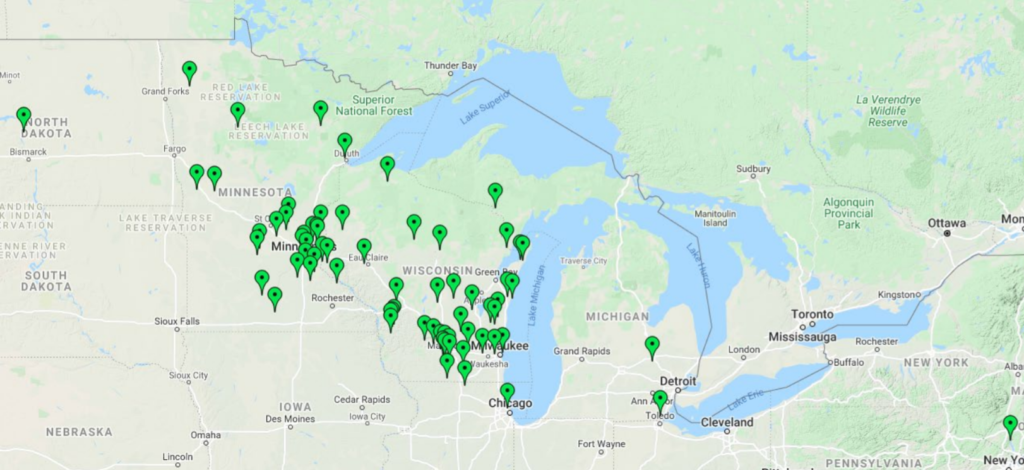
This trial was completed in collaboration with SeedLinked platform and the Minnesota Fruit & Vegetable Growers Association with funding from the Minnesota Department of Agriculture Specialty Crop Block Grant.
2022 Midwest Broccoli Trial Sign Up – Registration Closed
Before we dive into the 2021 trial results, we want to invite farmers and gardeners located in the upper midwest (Minnesota, Wisconsin, Michigan, North Dakota, and South Dakota), who like growing broccoli and are interested in being part of our continued research to identify varieties that are more resistant to black rot and Alternaria to sign up to be part of our 2022 Midwest Broccoli trials on SeedLinked. Learn more and sign up at the links below.
2021 Broccoli Varieties Trialed
| Broccoli Variety | Breeder | Early Trial – June 1 Planting | Late Trial – July 1 Planting | Notes |
|---|---|---|---|---|
| Asteroid | H.M. Clause | X | X | |
| Avenger | Sakata | X | ||
| Batory | Syngenta | X | ||
| Belstar | Bejo | X | ||
| Covina | Bejo | X | Sprouting Broccoli | |
| DeCicco | Landrace | X | ||
| Diplomat | Sakata | X | ||
| Eastern Magic | Sakata | X | ||
| Expo | Sakata | X | ||
| Fiesta | Bejo | X | ||
| Green Lady | Pureline | X | X | |
| Green Magic | Sakata | X | X | |
| Gypsy | Sakata | X | ||
| Imperial | Sakata | X | ||
| Jacaranda | Pureline | X | Purple Cauliflower Cross | |
| Lieutenant | Seminis | X | ||
| Luna | H.M. Clause | X | X | |
| Monty | ISI Sementi | X | X | |
| P13CMS x P1A | Cornell | X | X | Crossed with Kale, Experimental Variety |
| Paraiso | American Takii | X | X | |
| Sequoia | Pureline | X | X | |
| SEXP1 | Sakata | X | Experimental Variety | |
| SEXP2 | Sakata | X | Experimental Variety | |
| Waltham 29 | Landrace | X | Sprouting Broccoli | |
| Wolfman | Hazera | X |
Early Trial: June 1 Planting
Earliness: There was significant variability in earliness and harvest duration in the SROC trial (Figure 2). The earliest varieties were Asteroid, Green Lady, Gypsy, Luna, Monty, and P13CMSxP1A. Avenger, Batory, Jacaranda, and SEXP1 were notably later. Some varieties ripened very evenly, with all plants producing heads within a short period of time (e.g., Asteroid, Gypsy), whereas others were less even, with harvests spread out over weeks (e.g., Paraiso, Green Magic).
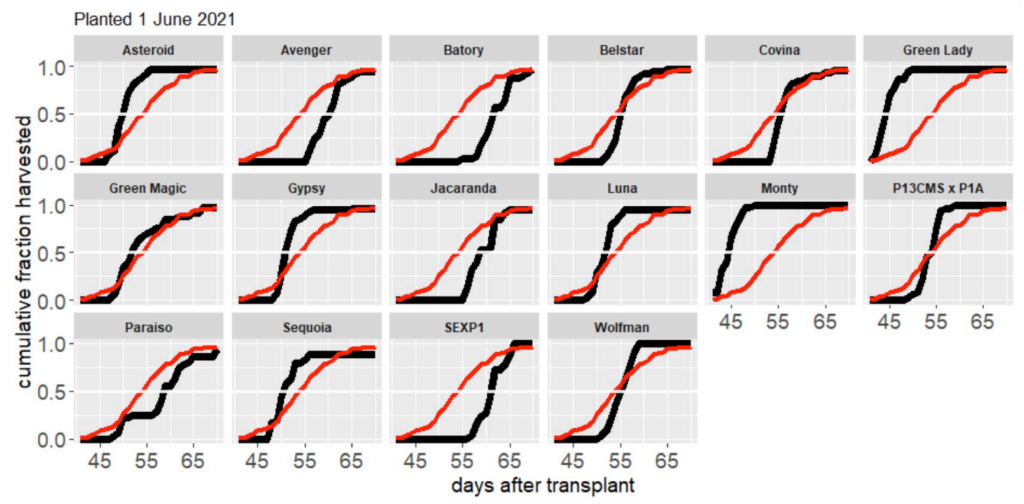
54 days, and harvest nearly complete by 65 days. The black lines represent harvest time for each variety.
In the on-farm trials, Green Magic, SEXP1, Monty, Luna, and Green Lady were all above average for earliness, whereas P13CMSxP1A, Paraiso, Covina, and Avenger were all later than average (Figure 3).
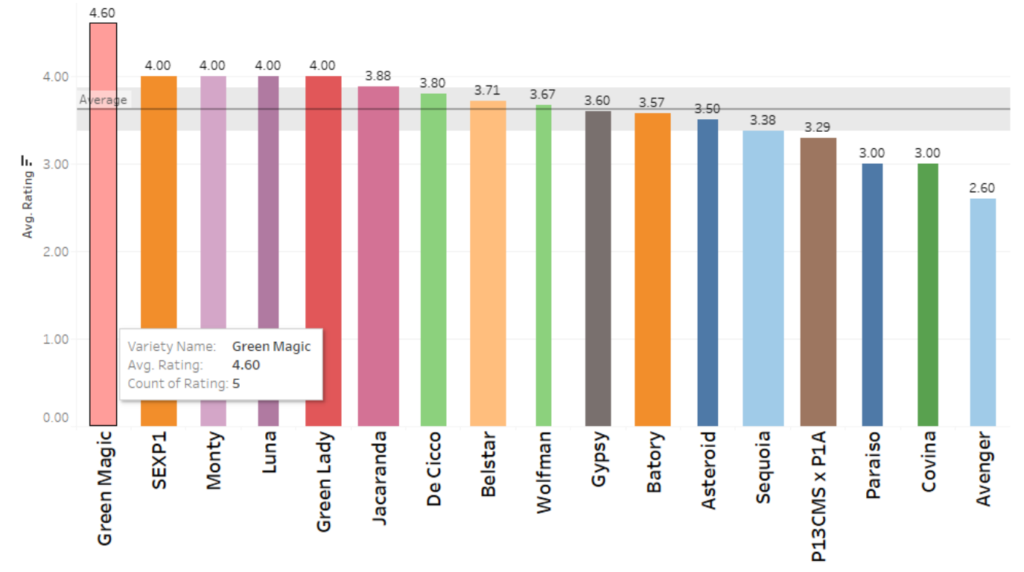
Yield: Yield was measured in multiple ways, including % of plants with marketable heads (Figure 4), head weight (listed in Table 1 below), and head weight * % marketable heads. In the early trial at SROC, all varieties except Sequoia produced nearly 100% marketable heads.
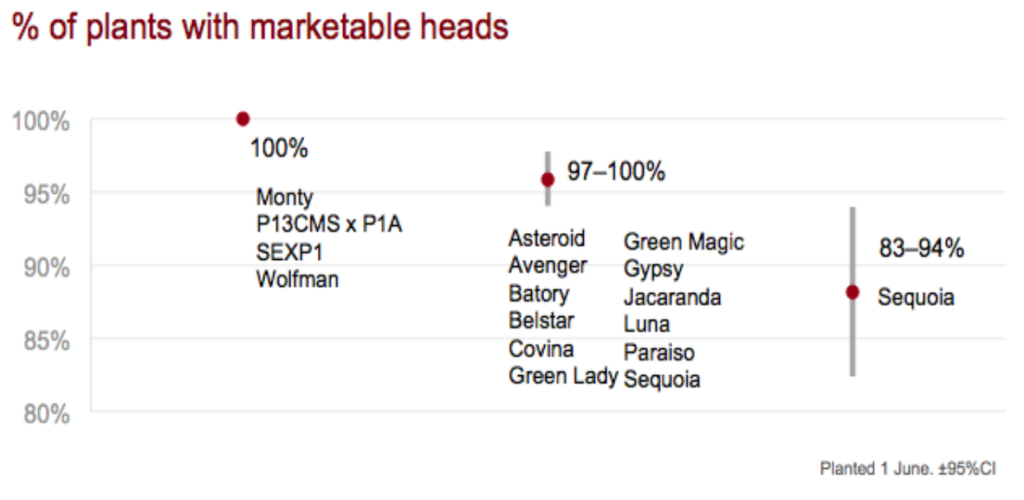
Sequoia, the variety that produced the lowest percentage of marketable heads, also produced the largest heads. While a larger head size results in more marketable pounds per acre, some growers may wish to grow smaller heads based on their customer needs. Figure 5 maps percent marketability with average head size.
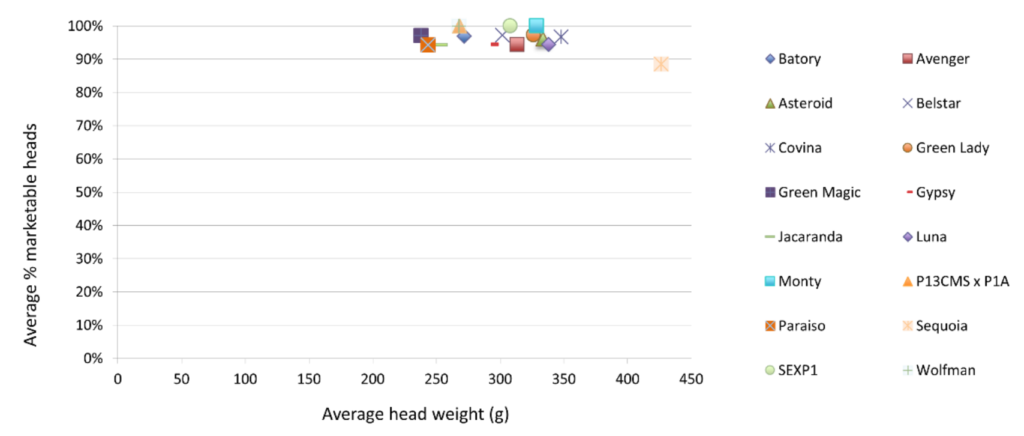
DeCicco is not listed on these graphs since it is a sprouting broccoli, and thus the head measurements did not apply. The average DeCicco plant produced an average of 2.76 heads, which were 49.64 grams each, for an average total weight of 133 grams harvestable shoots.
Finally, Figure 6 depicts grower rankings of yield. Rankings were submitted on a 1-5 scale.
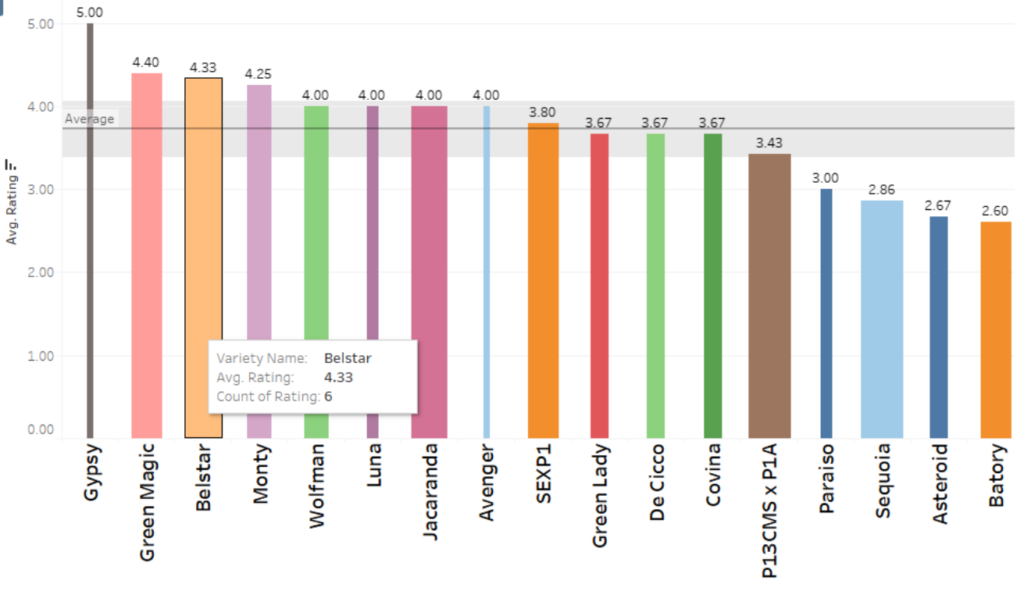
Disease: Disease pressure was non-existent in the early planted trial at the SROC due to extreme heat and drought. Farmer participants reported significant differences in disease tolerance (Figure 7). These results should be considered with caution due to regional differences in precipitation, with many areas included in the trial experiencing extreme drought. Differences in disease pressure may have been more attributable to local weather conditions than variety performance. Since growers only received 3-6 varieties each, not all varieties were trialed in all locations.
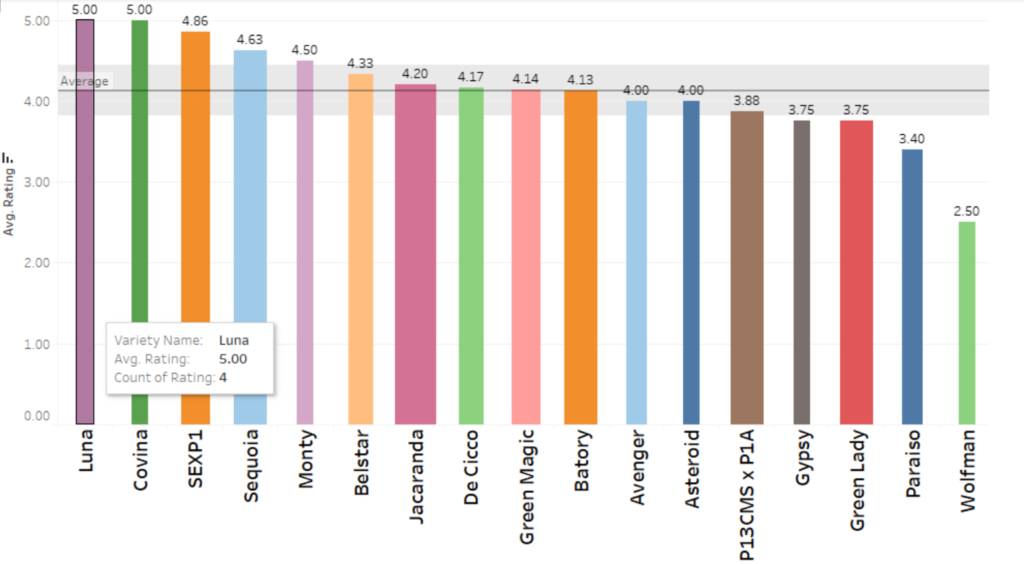
Additional Characteristics – Early Planting: The following characteristics were also measured in the SROC trial. Alternaria and Black Rot rankings are not listed because they were “0” for all varieties.

On-Farm Broccoli Trial Results on SeedLinked – Early Planting: View basic charts, grower comments and images by variety. We highly recommend logging into your existing SeedLinked account or creating an account when viewing the results so that you have access to filtering by hardiness zone to zero in on varieties that performed well in your location. Additionally, we recommend checking out our blog ‘Digging into SeedLinked Trial Results‘ to learn about all the ways you can filter and view trial results.
Late Trial: July 1 Planting
Earliness: There was significant variability in earliness and harvest duration again in the later planted trial at SROC (Figure 9). Due to disease pressure and other issues, many varieties were not 100% harvested. The earliest varieties were Asteroid, Green Magic, Luna, and Monty. Expo, Fiesta, P13, and Paraiso were notably later. Some varieties ripened very evenly, with all plants producing heads within a short period of time (e.g., Asteroid, Green Magic, Imperial, Lieutenant, Luna), whereas a few were less even, with harvests spread out over weeks (e.g., P13). In general, the varieties in the later planting matured more evenly.
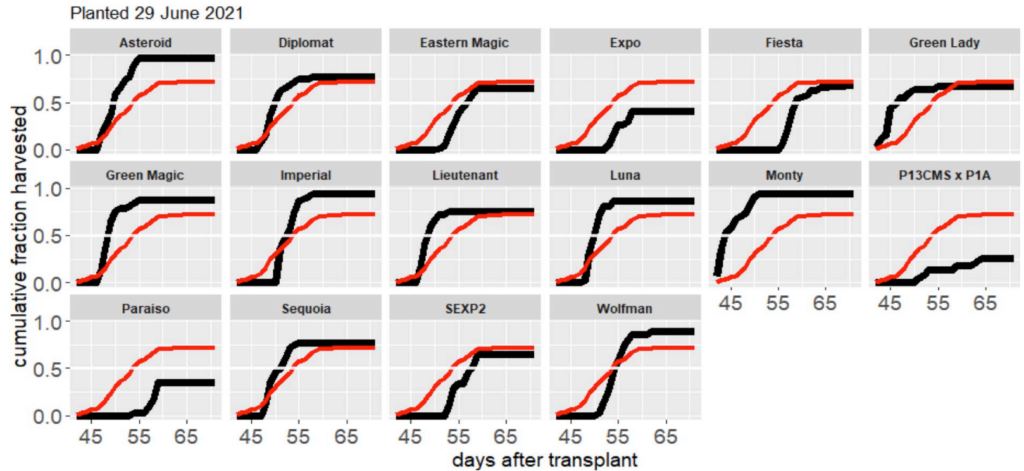
On-farm earliness results were fairly similar (Figure 10). Asteroid and Lieutenant were notably later in the on-farm trials than at SROC. Sequoia was earlier in the on-farm trials. Packman is listed as the earliest variety; this variety was not formally part of the trial and thus was not reported from SROC, but growers were invited to submit reviews for additional varieties.
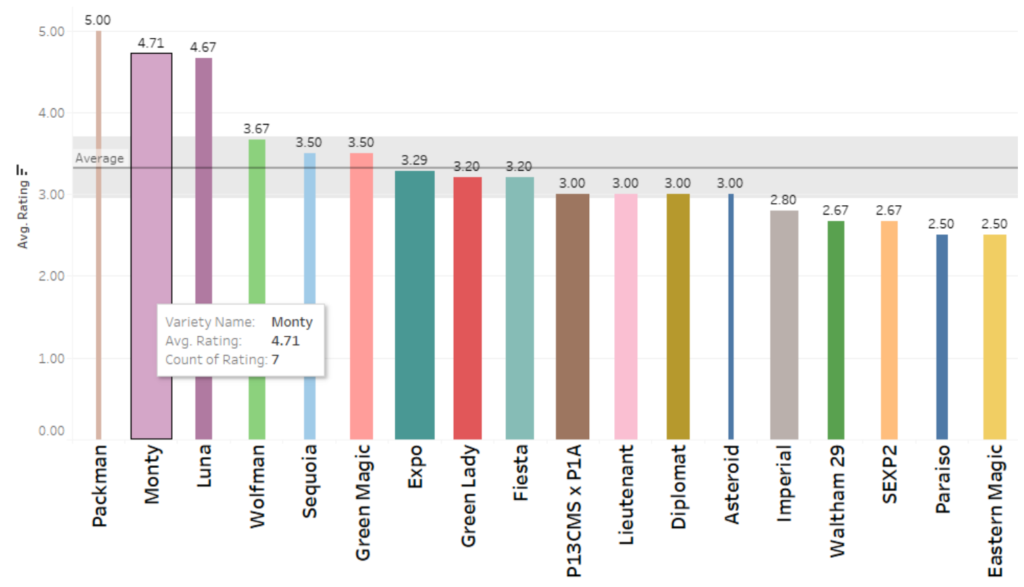
Yield: Yield was measured in multiple ways, including % of plants with marketable heads (Figure 11), head weight (listed in Table 4 below), and head weight * % marketable heads (Figure 12). In the later trial at SROC, most varieties performed significantly worse than in the early trial. The group of varieties with the best marketability included Asteroid, Green Magic, Imperial, Luna, Monty, and Wolfman. Figure 11 depicts a wide range of marketability. This is due to differences from plot to plot; each variety was replicated four times, with 9 plants per plot.
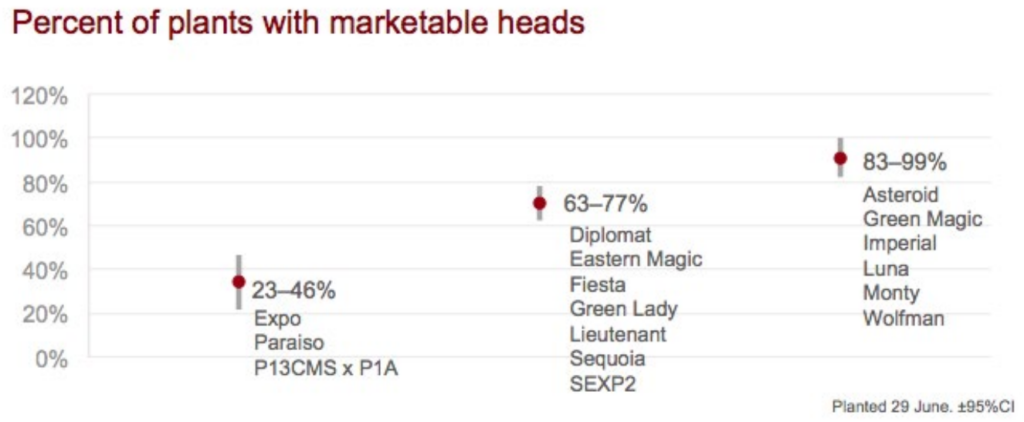
Figure 12 depicts the average head weight multiplied by % marketable heads, to show the average marketable pounds of broccoli heads per plant. Overall, head size trended slightly larger in the later planted trial than in the early trial, and there was much more variation in marketability due to increased black rot, Alternaria, and brown bead.
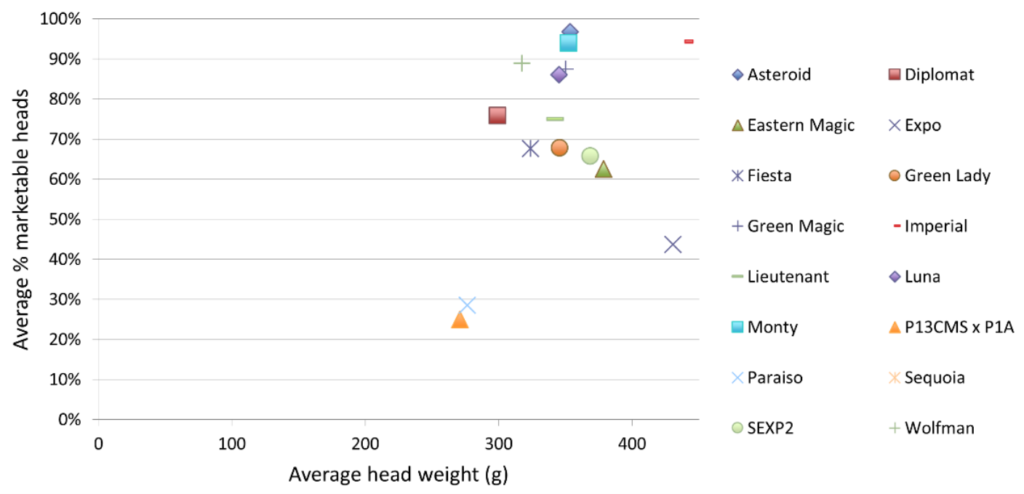
Waltham 29 is not listed on these graphs since it is a sprouting broccoli, and thus the head measurements did not apply. The average Waltham 29 plant produced 3.09 heads, which were an average of 234.45 grams each, for an average total weight of 468.91 grams harvestable shoots.
Finally, Figure 13 depicts grower rankings of yield in the later trial. Varieties that performed better in the on-farm trials than the SROC trial include: SEXP2, Packman (not included in SROC trial), and Expo. Luna performed worse in the on-farm trials than the SROC trial.
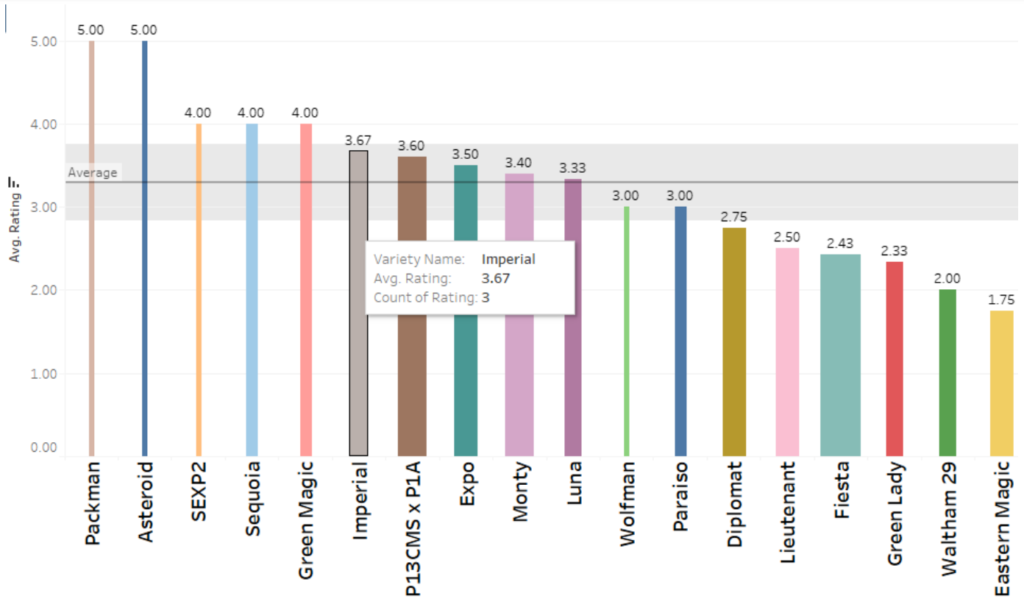
Disease: Disease pressure was significantly worse in the later planting. At SROC, Alternaria was more prevalent than black rot. Figure 14 shows overall disease rankings; Table 4 below includes individual rankings for each disease. In the SROC trial, only two varieties had no disease pressure in the heads: Asteroid and Imperial. Many of the varieties experienced a low rate of disease pressure around 10%. Expo and Paraiso had notably less tolerance, with around 60% diseased heads on average.
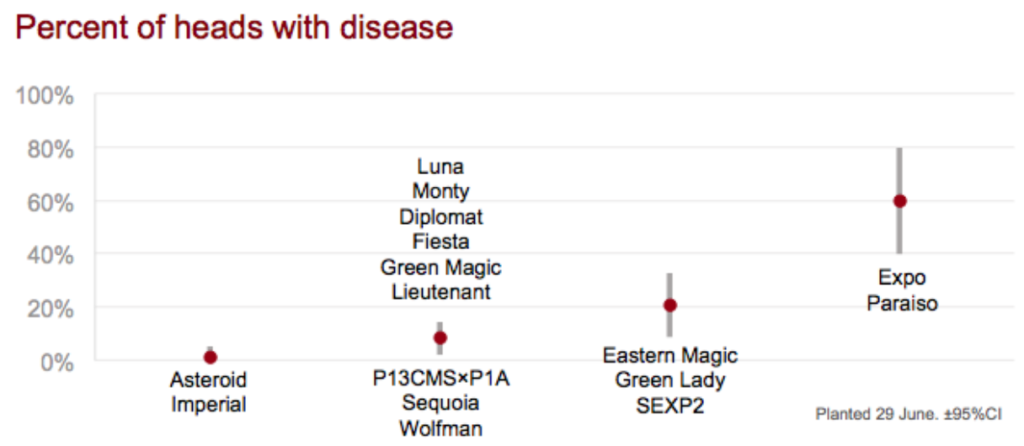
Farmer participants also saw significant differences in disease tolerance. (Figure 15). In the grower trials, Asteroid only had average disease tolerance, and Imperial was just slightly above average. SEXP2 had the highest tolerance in the grower trial, which contrasts with the SROC results, where 20% of the heads experienced disease pressure. Luna, Diplomat, Monty, and Imperial had the most consistently high disease tolerance rankings across both
trials.
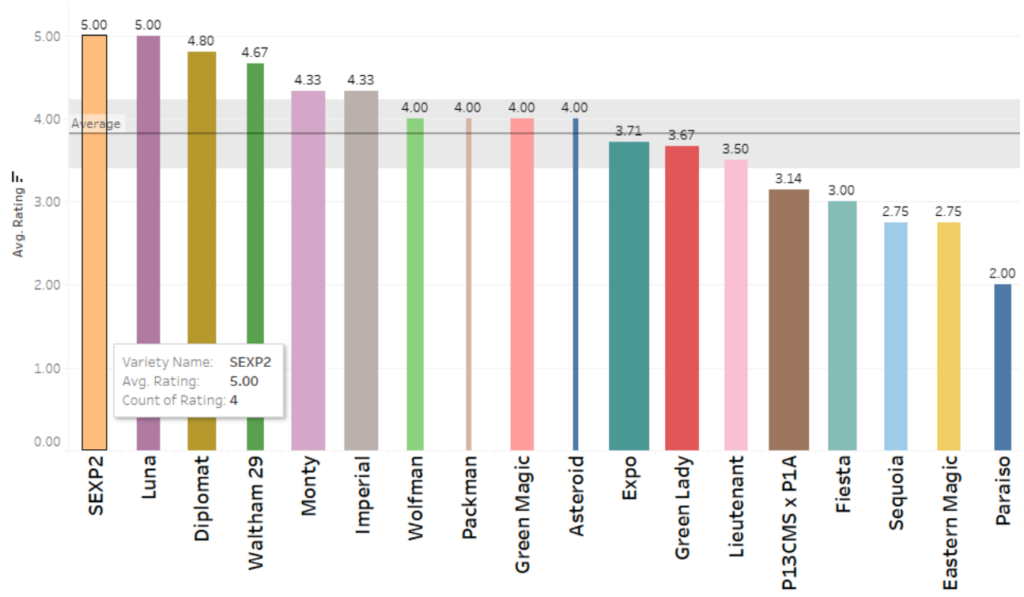
Additional Characteristics – Late Planting: The following characteristics were also measured in the SROC trial.

On-Farm Broccoli Trial Results on SeedLinked – Late Planting: View basic charts, grower comments, and images by variety. We highly recommend logging into your existing SeedLinked account or creating an account when viewing the results so that you have access to filtering by hardiness zone to zero in on varieties that performed well in your location. Additionally, we recommend checking out our blog ‘Digging into SeedLinked Trial Results‘ to learn about all the ways you can filter and view trial results.
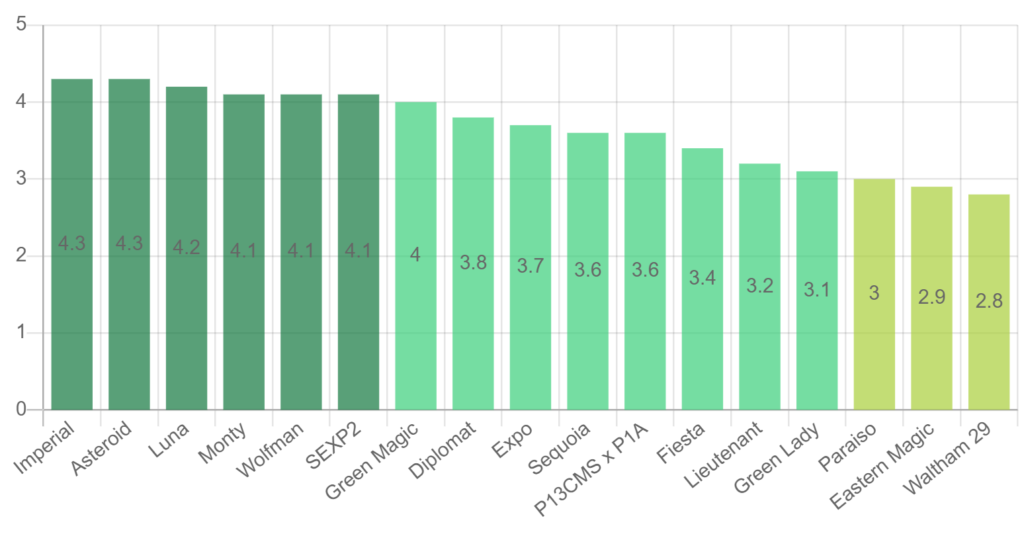
If you’re interested in joining our 2022 Midwest Broccoli trials or being part of other trials on SeedLinked, check out our current available collaborative trial sign-up list here.
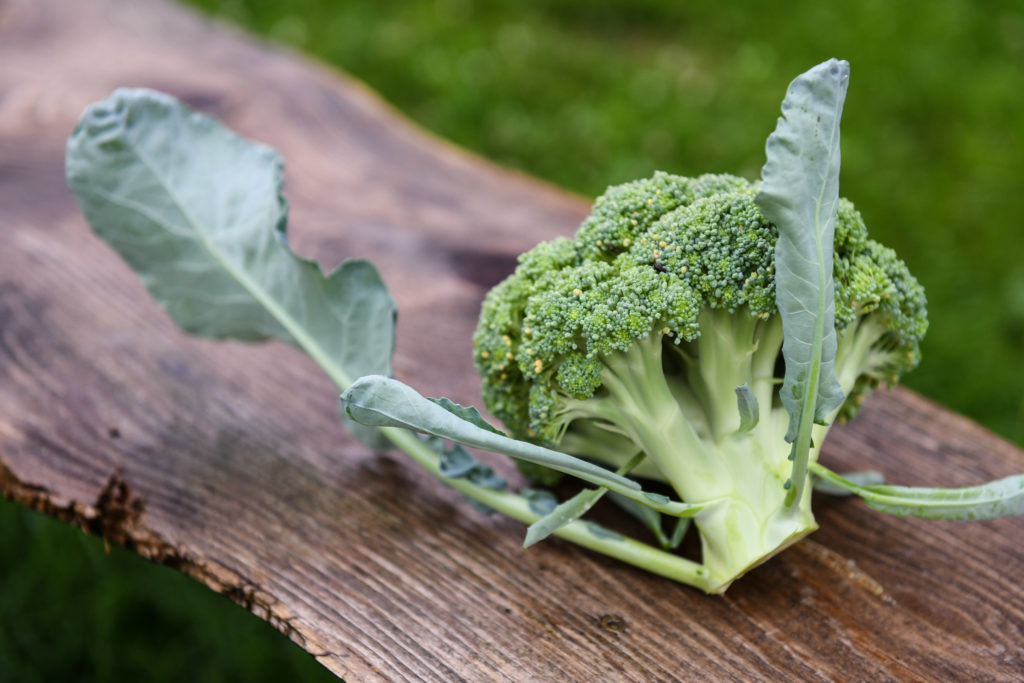
Published on 1/19/22
Collaborative trial results are in! In 2021, we organized three trials for three different crops – indeterminate paste tomatoes, fresh market green bush beans, and jalapeño peppers. The goal of each trial was to grow well-known varieties side-by-side with newly released hybrid and open-pollinated varieties and freely share the results on our Seed Search and in this blog with growers, seed companies, and anyone else who is interested.
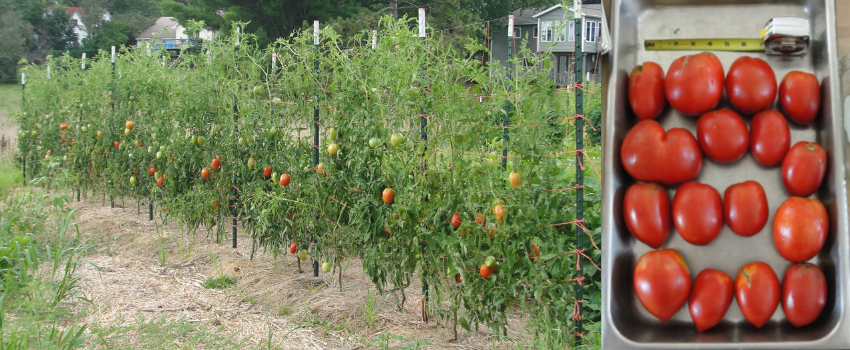
Trial Methods
In January 2021, we canvased United States seed company offerings and selected varieties in each crop/market class that were standard open-pollinated and hybrid varieties. Additionally, we looked for newly bred and/or released open-pollinated and hybrid varieties to grow alongside them for comparison in these trials.
In February 2021, we invited farmers and gardeners across the United States to join our three trials via the SeedLinked platform by reaching out to those who have successfully been part of trials in the past as well as through an open link on our website. We had 92 growers join the indeterminate paste tomato trial, 113 growers join the fresh market green bush bean trial, and 73 growers join the jalapeño pepper trial. Each of these trials was a sub-set trial, where each participant was randomly assigned three varieties of a larger set to grow side-by-side and rate them. Also in this month, we mailed seeds and planting stakes to participants and made the trial active on the SeedLinked platform.
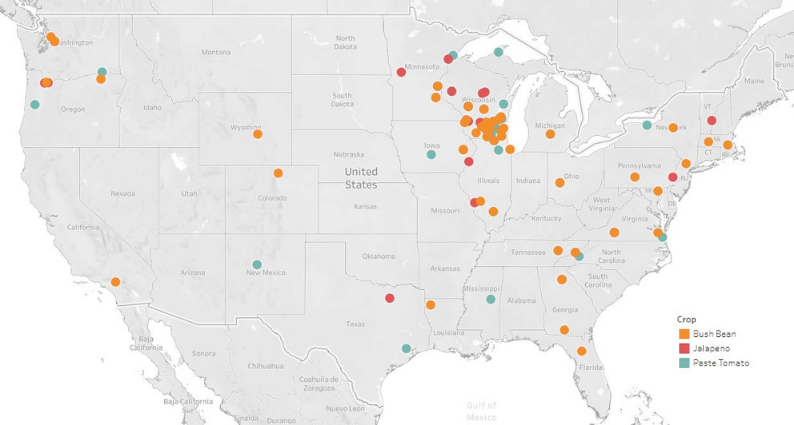
During the 2021 growing season, trial participants were asked to grow the varieties provided to them. The participants logged in to SeedLinked on the web and/or mobile app and input the following data: planting, transplanting, first harvest, and last harvest dates, rate a variety of traits on a scale of 1 to 5 stars, provide general and trait-based written comments, and share photos of the varieties growing.
Trial Results
Once the trials were closed for entering data in December 2021, results were automatically calculated by the SeedLinked platform and shared with participants. You can view links to interactive trial results below. We highly recommend logging into your existing SeedLinked account or creating an account when viewing the results. This gives you the opportunity to filter results by hardiness zone to zero in on varieties that performed well in your location. Additionally, we recommend checking out our blog ‘Digging into SeedLinked Trial Results‘ to learn how to filter and view trial results.
2021 Indeterminate Paste Tomato Collaborative Trial Results
Varieties in this trial were: Amish Paste, Cipolla’s Pride, Emma’s Damn, Granadero, Marzito, Midnight Roma, Myona Paste, Plum Perfect, Pozzano, Salvaterra’s Select, and San Marzano. Trial participants rated the plants and fruit on the following traits on a scale of 1 to 5 throughout the growing season: Appearance, Disease Resistance, Earliness, Flavor, Germination, Vigor, Yield, and Overall. To view the interactive results on SeedLinked, click HERE.
2021 Fresh Market Green Bush Bean Collaborative Trial Results
Varieties in the trial were: Affirmed, Antigua, Celine, Crokett, Empress, Jade, Maxibel, Provider, and Provider Premium. Trial participants rated the plants and fruit on the following traits on a scale of 1 to 5 throughout the growing season: Appearance, Disease Resistance, Earliness, Flavor, Germination, Vigor, and Yield. To view the interactive trial results on SeedLinked, click HERE.
2021 Jalapeño Pepper Collaborative Trial Results
Varieties in the trial were: Black Magic, Early Jalapeño, El Jefe, Jalafuego, Jalapeño Travelers Strain, Jedi, Mild to Medium Jalapeño Grex, and Nadapeno. Trial participants rated the plants and fruit on the following traits on a scale of 1 to 5 throughout the growing season: Appearance, Canopy Closure, Disease Resistance, Earliness, Flavor, Germination, Spiciness, Vigor, and Yield. To view the interactive results on SeedLinked, click the HERE.
Appreciations
Thank you to all of the gardeners and farmers who participated in SeedLinked trials in 2021. With your help, we are creating more open-source data for how vegetable varieties perform across the United States. Additionally, we would like to thank all the seed companies that shared seeds with us for the trials. Thanks for being open to having your varieties tested by a wider audience of growers around the United States.
Published 12/30/21
Alright! You’ve finished entering reviews, adding photos and comments, and have completed your collaborative variety trial. Now you’re done being on SeedLinked until the next growing season. Not so quick! There are many benefits to staying engaged on SeedLinked. The primary reason is having access to collaborative variety trial results to help better inform your seed choices for the next growing season.
Did you know that you can access aggregated variety trial results immediately after you complete a trial on the web platform or app?
Trial results can help you pick what varieties to grow in the future. When it comes to picking a variety to grow, what is most important to you? Flavor? Disease resistance? Yield? Seeing photos of the variety growing? Reading comments from other growers? The beauty of SeedLinked trial results is that you can focus on what is important to you when determining what varieties to grow next year.
Ways you can view Trial Results on SeedLinked:

Want to dive into variety trial results? Here is a step-by-step guide on how to use trial results to the fullest on our web platform and apps.
Trial Results on the Web Platform
Let’s start with accessing collaborative variety trial results on the SeedLinked web platform. Log in to your account and navigate to the ‘Track’ tab at the top of the page and click on ‘Results’ on the grey sidebar on the left. You can sort your trial results by crop type or by year. Find a trial you’d like to view the results for and click on the blue ‘Results’ button to the right of the trial.
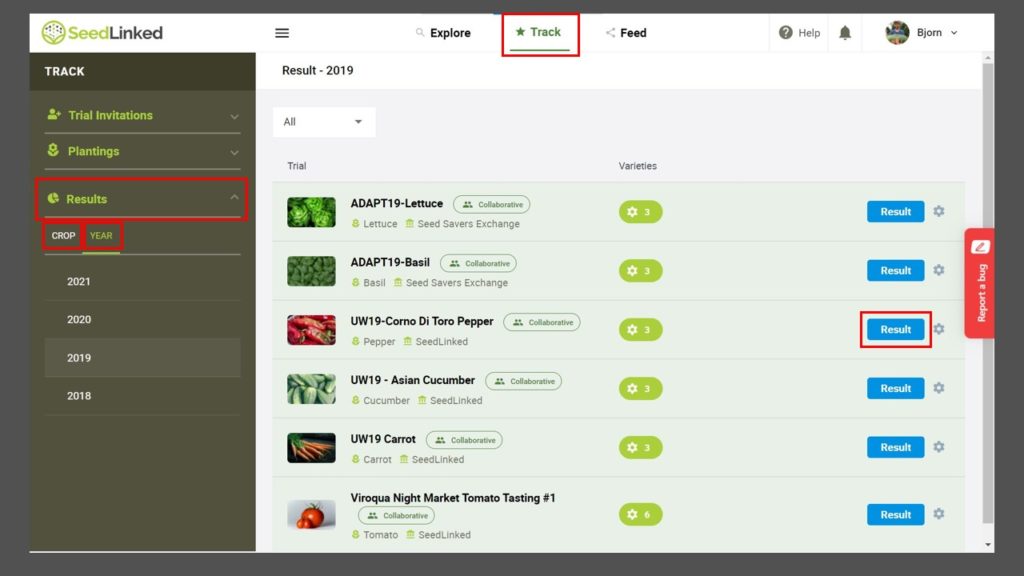
Congratulations! You are on the results page for a trial. Now, let’s take a look around at the ways you view results. First, you can select traits that you’d like to see ratings for. For example, if you are only interested in ‘disease resistance’ and ‘earliness’, you can select those traits and view only those aggregated ratings. Click on ‘Select Traits,’ select your traits, and hit ‘Save.’

Next, under the ‘Roles’ tab select who you’d like to see ratings from: gardeners, farmers, and/or trial managers and click ‘Save.’

Then you can select if you’d like to see results from everyone in the trial or only those reviewers in your hardiness zone. Click on ‘Hardiness Zone’ and either select ‘All’ or ‘My Hardiness Zone.’

If you only want to see results for two or three varieties that were in the trial, you can remove varieties from the results by clicking ‘Select Varieties’ and choosing the varieties you’d like to see reviews for.

When you completed your trial, you filled in a ‘Would you like to grow this again? Survey.’ You can view the results of that survey on the right side of the page. Be sure to scroll down if there are more than four varieties!

Lastly, if you want to look at the photos and comments reviewers shared about each variety, you can click on the camera or comment icon below the variety name. Be sure to like images and comments that are helpful to you! Ones with more likes rise to the top of the list and be featured on our Seed Search.



If you decide that you want to purchase seeds of a particular variety that was in a trial, you can click on the variety name in the ‘Would like to grow this again?’ survey results and this will take you to the SeedLinked Marketplace variety page where you can purchase seeds for that variety if they are available.
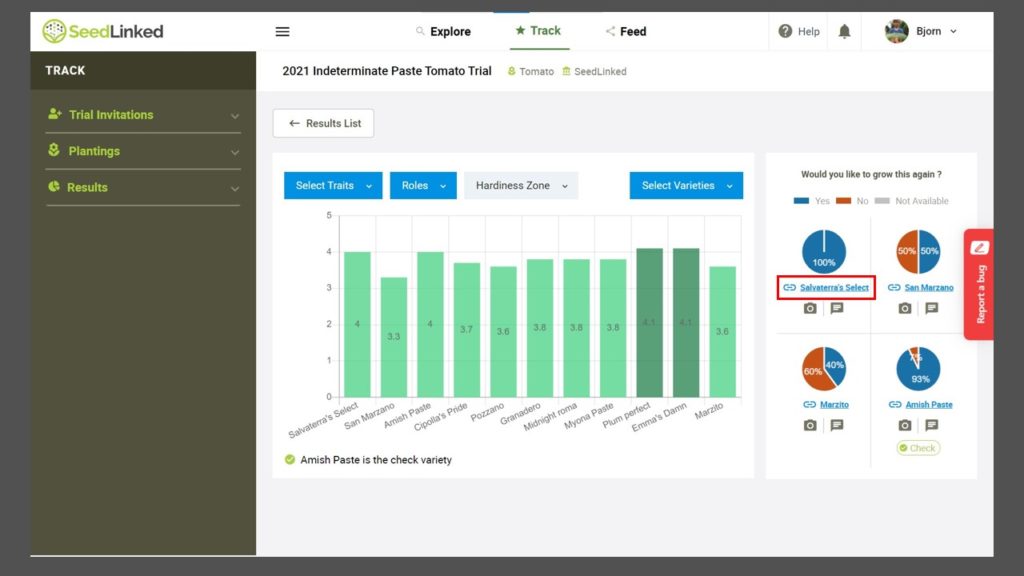
Trial Results on the App
Next, let’s shift gears and talk about viewing results on the SeedLinked App. First of all, be sure to download the app on your phone or tablet (Link to download for Android devices or iPhone/iPad).
Open the app, log in to your SeedLinked account, and navigate to the ‘Track’ tab at the bottom center of the screen. Click on ‘Results’ in the top right. On the Results page you can scroll down through all the results you have access to or you can filter them by crop or by year using the filters. Once you find the trial that you like to view results for, click on the trial.
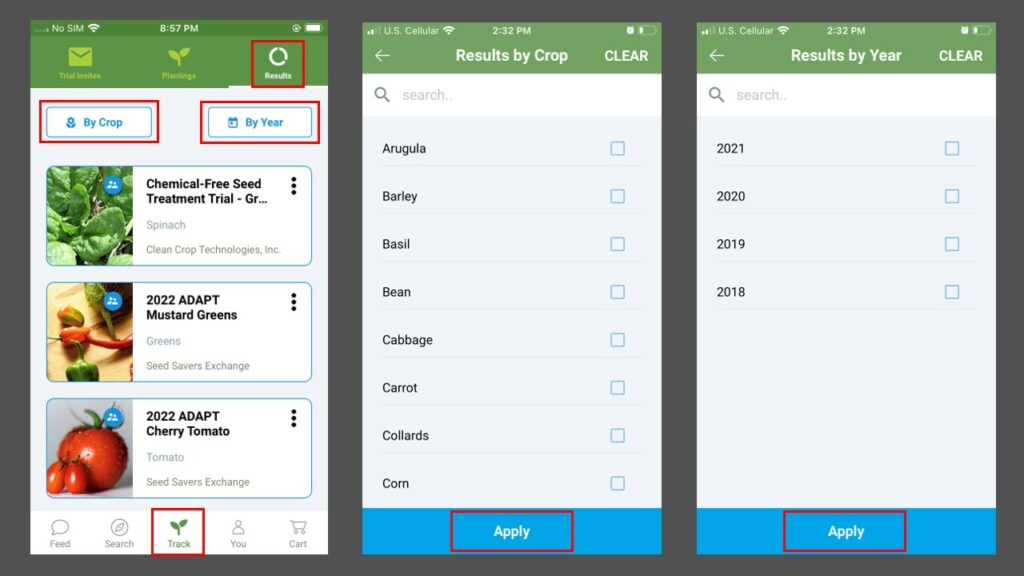
Welcome to trial results on the app! Now it’s time to dig into your results. You can toggle between seeing results from all trial participants or just those in your hardiness zone by toggling between ‘All Reviews’ and ‘Your Zone’ at the bottom of the screen. If there is a specific trait that is most important to you like yield, disease resistance, or flavor, you can filter the results by those traits by clicking on ‘Select Traits’ and selecting the traits you’d like to view and clicking ‘Apply.’

Next, you can access the graphs for the ‘Would you like to grow this again? survey’ that each trial participant took part in when they completed their trial. Click on the three dots to the right of a variety rating and click on the ‘Grow Again?’ icon. On this screen you can toggle between varieties by using the arrows next to the variety name.
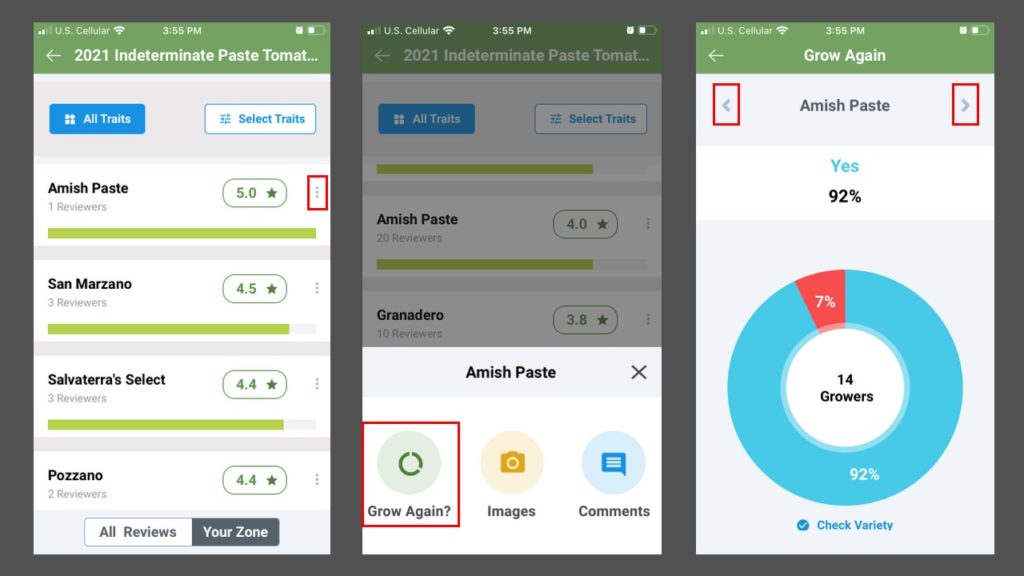
Last, you can access photos and comments submitted by trial participants by clicking on the three dots to the right of a variety rating and clicking on either the ‘Images’ or ‘Comments’ icon to view them for each variety. You can toggle between variety images/comments using the arrows next to the variety name. Don’t forget to like images/comments that you feel are most helpful! Images/comments with the most ‘likes’ rise to the top of the list in results and on the Seed Marketplace.
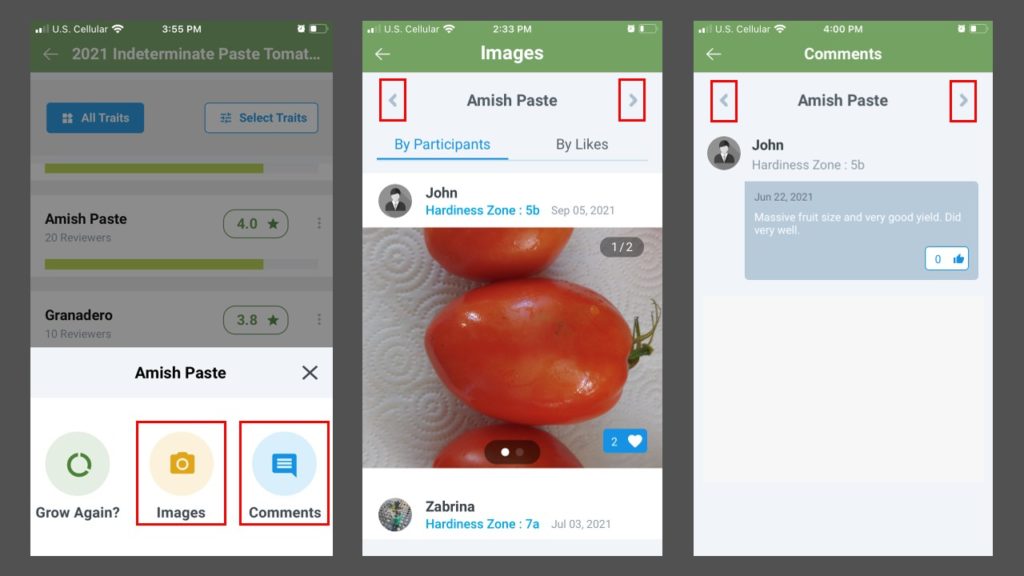
Thanks for learning all about the SeedLinked Trial Results! We encourage you to log in to your profile on the web or app and view the results for a collaborative variety trial you participated in on SeedLinked. We hope that the results feature gives you a way to find the right variety for you to grow next season.
Additionally, the results from over 350 collaborative variety trials run on the SeedLinked platform since 2018 are the foundation of our Seed Marketplace variety reviews. If you want to see overall ratings for varieties across geography, beyond your trial, search for and purchase seed on our Seed Marketplace.
If you have any ideas for how to visualize collaborative trial results, please share them with us at feedback@seedlinked.com We would love to hear from you!
Updated 11/16/22

